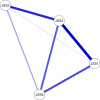Translating and establishing the psychometric properties of the Jenkins Sleep Scale for Arabic-speaking individuals
- PMID: 38549105
- PMCID: PMC10976800
- DOI: 10.1186/s12888-024-05714-2
Translating and establishing the psychometric properties of the Jenkins Sleep Scale for Arabic-speaking individuals
Abstract
Background: The Jenkins Sleep Scale is a widely used self-report questionnaire that assesses sleep quality and disturbances. This study aimed to translate the scale into Arabic and evaluate its psychometric properties in an Arabic-speaking population.
Methods: The Jenkins Sleep Scale was translated into Arabic using forward and backward translation procedures. The Arabic version was administered to a convenience sample of 420 adults along with the Pittsburgh Sleep Quality Index (PSQI) and Athens Insomnia Scale (AIS) for validation purposes. Reliability was examined using Cronbach's alpha and McDonald's omega coefficients. Confirmatory factor analysis (CFA) was also conducted to test the unidimensional factor structure. Convergent validity was assessed using correlations with PSQI and AIS scores.
Results: The Cronbach's alpha and McDonald's omega values for the Arabic Jenkins Sleep Scale were 0.74 and 0.75, respectively, indicating good internal consistency. The 2-week and 4-week test-retest intraclass correlation coefficients were both 0.94 (p < 0.001), indicating excellent test-retest reliability. The CFA results confirmed the unidimensional factor structure (CFI = 0.99, TLI = 0.96, RMSEA = 0.08). The measurement model had an equivalent factor structure, loadings, intercepts, and residuals across sex, age, and marital status. Significant positive correlations were found between the Arabic Jenkins scale score and the PSQI (r = 0.80, p < 0.001) and AIS (r = 0.74, p < 0.001), supporting convergent validity.
Conclusion: The Arabic version of the Jenkins Sleep Scale demonstrated good psychometric properties. The findings support its use as a valid and reliable measure for evaluating sleep quality and disturbances among Arabic-speaking populations.
Keywords: Arabic; Jenkins Sleep Scale; Psychometrics; Translation; Validation.
© 2024. The Author(s).
Conflict of interest statement
The authors declare no competing interests.
Figures
Similar articles
-
A multicountry study on the psychometric properties of the Arabic version of the Sleep Preoccupation Scale (SPS) using both classical testing theory and item response theory.BMC Psychol. 2024 Oct 8;12(1):542. doi: 10.1186/s40359-024-02038-4. BMC Psychol. 2024. PMID: 39380127 Free PMC article.
-
Examining the reliability and validity of the arabic version of the Glasgow Sleep Effort Scale (GSES).Sleep Breath. 2024 Aug;28(4):1831-1838. doi: 10.1007/s11325-024-03053-w. Epub 2024 May 13. Sleep Breath. 2024. PMID: 38735910
-
Adapting the athlete sleep behavior questionnaire (ASBQ) for Arabic-speaking populations: Translation, reliability testing, and validation using classical theory and item response theory.Sleep Med. 2024 Jul;119:267-275. doi: 10.1016/j.sleep.2024.04.037. Epub 2024 May 3. Sleep Med. 2024. PMID: 38710132
-
The translation and validation of the surgical anxiety questionnaire into the modern standard Arabic language: results from classical test theory and item response theory analyses.BMC Psychiatry. 2024 Oct 16;24(1):694. doi: 10.1186/s12888-024-06142-y. BMC Psychiatry. 2024. PMID: 39415158 Free PMC article.
-
Measuring Subjective Sleep Quality: A Review.Int J Environ Res Public Health. 2021 Jan 26;18(3):1082. doi: 10.3390/ijerph18031082. Int J Environ Res Public Health. 2021. PMID: 33530453 Free PMC article.
Cited by
-
A multicountry study on the psychometric properties of the Arabic version of the Sleep Preoccupation Scale (SPS) using both classical testing theory and item response theory.BMC Psychol. 2024 Oct 8;12(1):542. doi: 10.1186/s40359-024-02038-4. BMC Psychol. 2024. PMID: 39380127 Free PMC article.
-
Pre-Sleep Arousal Scale (PSAS): Translation and Evaluation of Its Psychometric Properties in an Arabic Version.Nat Sci Sleep. 2024 Oct 25;16:1725-1735. doi: 10.2147/NSS.S490206. eCollection 2024. Nat Sci Sleep. 2024. PMID: 39473629 Free PMC article.
References
-
- Strine TW, Chapman DP. Associations of frequent sleep insufficiency with health-related quality of life and health behaviors. Sleep Med 2005, 6(1). - PubMed
-
- Ohayon MM. Epidemiology of insomnia: what we know and what we still need to learn. Sleep Med Rev 2002, 6(2). - PubMed
-
- AlRasheed MM, Fekih-Romdhane F, Jahrami H, Pires GN, Saif Z, Alenezi AF, Humood A, Chen W, Dai H, Bragazzi N, et al. The prevalence and severity of insomnia symptoms during COVID-19: a global systematic review and individual participant data meta-analysis. Sleep Med. 2022;100:7–23. doi: 10.1016/j.sleep.2022.06.020. - DOI - PMC - PubMed
-
- Jahrami HA, Alhaj OA, Humood AM, Alenezi AF, Fekih-Romdhane F, AlRasheed MM, Saif ZQ, Bragazzi NL, Pandi-Perumal SR, BaHammam AS, et al. Sleep disturbances during the COVID-19 pandemic: a systematic review, meta-analysis, and meta-regression. Sleep Med Rev. 2022;62:101591. doi: 10.1016/j.smrv.2022.101591. - DOI - PMC - PubMed
-
- Merikanto I, Dauvilliers Y, Chung F, Wing YK, De Gennaro L, Holzinger B, Bjorvatn B, Morin CM, Penzel T, Benedict C, et al. Sleep symptoms are essential features of long-COVID - comparing healthy controls with COVID-19 cases of different severity in the international COVID sleep study (ICOSS-II) J Sleep Res. 2023;32(1):e13754. doi: 10.1111/jsr.13754. - DOI - PMC - PubMed
MeSH terms
LinkOut - more resources
Full Text Sources
Medical
Miscellaneous


